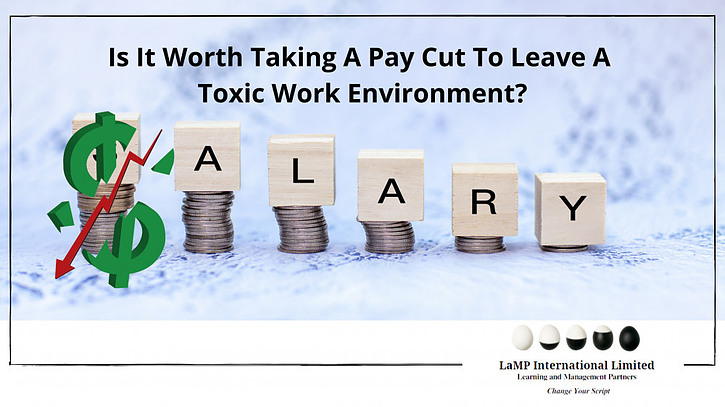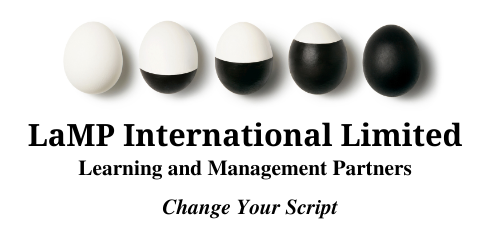
Straight off the block, I would say that it is worth taking a pay cut to leave a toxic work environment. However, I am a different animal.
I have strong self-confidence and fearless determination. With such courage and positive expectation, I know that better will come because I will find it.
Staying in a toxic work environment can hurt my inner management and I choose not to allow that.
What we allow is what will continue to happen to us.
Why Is It Worth Taking A Pay Cut To Leave A Toxic Work Environment?
It is worth taking a pay cut to leave a toxic work environment because, without good health and a stable mind, we are incongruent. When we are incongruent, we make weak choices. Weak choices lead to poor decisions. Poor decisions, over time, negatively impact our lives and result in deterioration, loss, conflict and chaos. We cannot function healthily when we are experiencing that flux of (dis)stress. It is much better to leave the environment, receive less pay, have good health and seek better opportunities.
There is a proviso here and it requires good management.
By good management, I mean that you:
- have been living below your means.
- are not riddled with debt because of consumerism.
- enjoy good health and well-being.
- practice inner management by applying management skills to your personal life.
- function congruently.
When we work for organisations as an employee, we must recognise that we have limited control over the quality of our work lives and what happens to us.
During the global pandemic of 2019 to 2022 many employees faced the harsh reality that work was not permanent, no matter how hard they worked or how good they were.
For those of us who are not benefitting from good management, here are some other things to consider.
ADDITIONAL READING >>>> Why Is Good Management Important?
A Pay Cut vs A Cut In Time
Most toxic work environments demand more of our time. This is true of the majority of (dis)stressful things that we have to manage.
When we are ill, negatively charged emotionally or physically hurt, it takes more time for us to recover and return to healthy functioning.
Problems demand more of our energy and deplete our resources, the major one being time. We find ourselves working more hours and days and not having enough time for ourselves and our families.
We think that we are getting more pay but that extra will have to be spent on medical bills or the additional cost of having someone sub in for us. For example, we have to pay a babysitter to look after our children while we work those extra hours.
Taking a position in a less toxic environment for less pay may give us more time to look for a better position, invest in our learning and development and have more time to regain our joy and happiness.
A Pay Cut vs A Cut In Self-Confidence
Staying too long in a toxic work environment will eventually erode your self-confidence, even if you think that you are strong. The environment will wear you down and weaken your ability to make healthy decisions and choices.
The majority of people I speak with in toxic environments and, from my own experiences, we soon start to second-guess ourselves and question our judgement. This is especially true if we are not receiving any support and encouragement.
The growing self-doubt, like all (dis)stress starts to manifest itself in our minds and bodies resulting in us acting out in misunderstood and confusing ways.
The downward spiral continues to pick up momentum and eventually it becomes too difficult to get ourselves out of the trap that we have created.
A Pay Cut vs. A Cut In Productivity
Managing toxicity in the workplace is a full-time job in itself.
You will be anxious to avoid conflict, interactions and being subjected to passive-aggressive actions or undermining behaviours from co-workers.
Your productivity will fall.
This eats physical time and mental energy which will eventually lead to exhaustion and even illness. Another vicious and destructive cycle is created because productivity will be lowered, more so when ill health surfaces.
A drop in performance attracts the spotlight and this becomes the focal issue. The expectation is that we will continue to deliver results in spite of the environment.
If you are the only person expressing discontent or displaying lower productivity then the spotlight will shine brighter on you.
RELATED TOPIC >>>> Which Is Worse, Toxic Leadership Or Passive Leadership?
A Cut In Pay vs. A Cut In Happiness
Recently, there has been a lot of discussion and emphasis on the role that work plays in our lives. We spend upwards of 35 to 55 percent of our waking time working. Spending that amount of time in our lives being unhappy is an unfulfilling sacrifice.
If we practise good management in our life, we understand how short, unpredictable and important it is. The ability to enjoy a happy life and to share that happiness in our relationships defines our own well-being.
Happiness is not about how much money you have or how much you earn. Money is only one part of the equation.
What is the point of holding on to more pay if your well-being suffers and your happiness dissipates until you are no good to yourself or your loved ones?
That should always rank higher than money.
A Pay Cut vs. A Cut In Health
There is positive stress – eustress – and negative stress – distress. We all need to work towards having more eustress in our lives.
Toxic work environments produce distress. Distress eats away at our physical and mental health. Research proves that distress is manifested in our physical bodies in the form of sickness and disease.
According to the American Psychological Association, (APA), (dis)stress “affects all systems of the body including the musculoskeletal, respiratory, cardiovascular, endocrine, gastrointestinal, nervous, and reproductive systems“.
They go on to say: “Our bodies are well equipped to handle stress in small doses, but when that stress becomes long-term or chronic, it can have serious effects on your body.”
Choosing to stay in a toxic work environment because the job it pays more can result in a much greater loss. The money (and more) may be required to pay for your mental, emotional and physical recovery.
My Closing Thoughts . . .
I have worked in a few toxic work environments. None of the experiences was pleasant. Some went on longer than others but I know now that I stayed in all of them too long.
During those experiences, I felt myself retreat and break down. One of those experiences was so destructive to me that I actually had to be medicated and spent a couple of weeks away from work recovering.
As I got older, I got wiser, stronger and more congruent.
That made it easier to recognise the signs earlier. I knew what I was looking for and how to protect myself and my well-being.
Thankfully, I can now use those experiences to help others. It is the nature of the coaching and consulting work that I travel the world to facilitate.
Unfortunately, not everyone is as fortunate as I am.
FURTHER READING >>>> What Is Congruent Behaviour?
The Strategy Of Congruence
Our Strategy of Congruence framework helps conflicted, wounded and powerless professionals and organisations become congruent, energetic and dominant in their lives and their industries, respectively.
We approach organisations as Living Systems because, in reality, they are a collection of all the human beings who function within them and interact with them.
If any link (individual) is weak or broken, so too will the organisation be.
Would you like to get more information about our interventions, coaching, facilitation and programs? If so, please leave us a comment and message below.
The pleasure would be ours to support you.
About The Author
Cassandra is a Management Consultant, internationally qualified Facilitator, Executive Coach, Strategist and Behaviour Change Agent.
She enjoys travelling, exploring cultures and learning about historical and social networks and dynamics.
Her driving force is the education and development of her tween daughter. The roots of her inspiration to diversify her niche markets and the motivation to expand and scale her business investments rest firmly in this relationship.
This is the reason for building her legacy.
